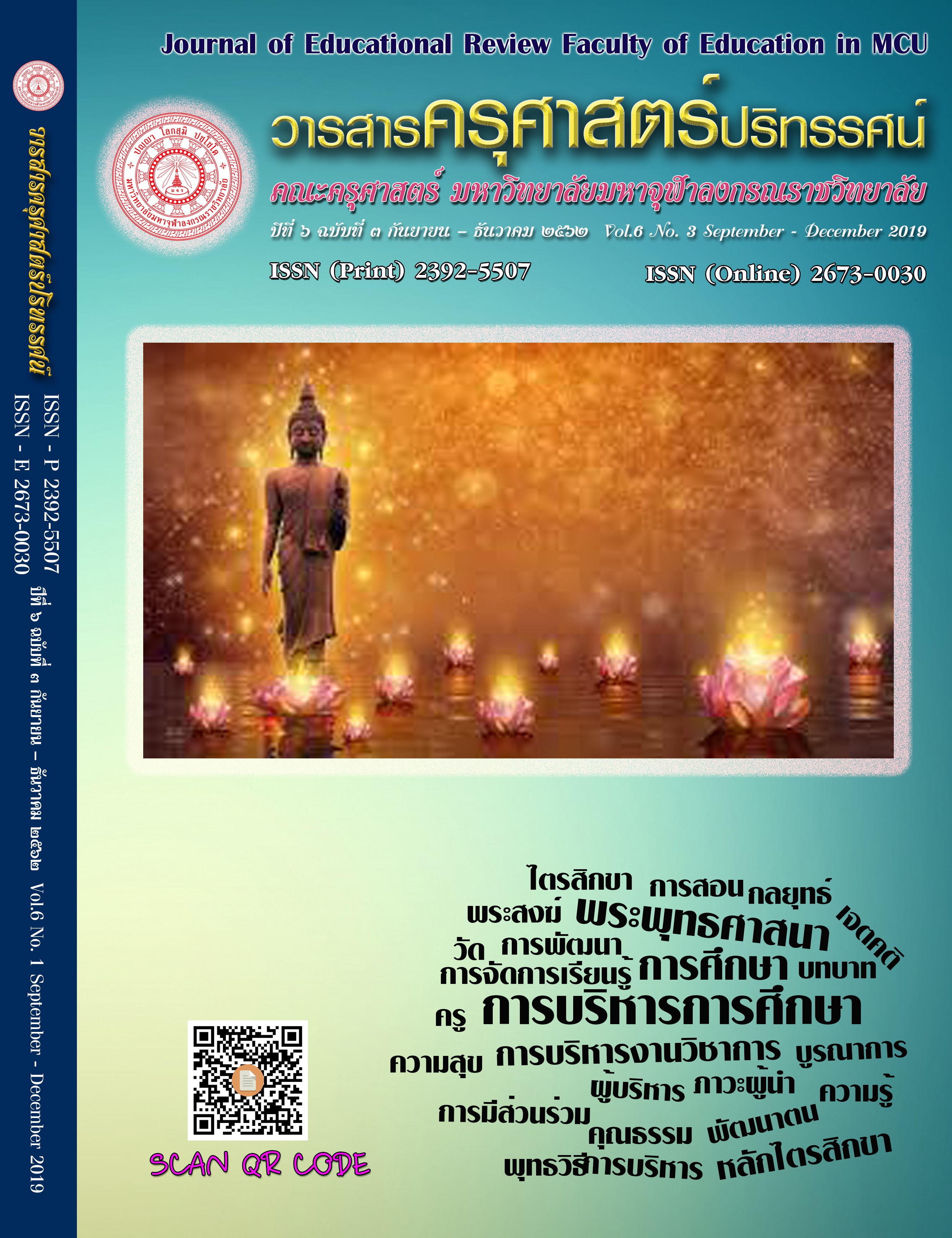Self-Management in Accordance With the Buddhist Principles for the Administration of Educational Organizations
Main Article Content
Abstract
Self-management in accordance with the Buddhist Dhamma for managing educational organizations. It is the application of 4 principles of dhamma, which are integrated with self-administration for the benefit of educational organization administration. Which is a collaborative process of consciousness and intelligence (consciousness), which means consciousness The administrators of educational organizations use consciousness to see with wisdom, knowing as they actually happen in all 4 areas, namely body, feeling, mind and Dharma, consisting of 1) self-management with support Executive use of consciousness according to view with intelligence, knowing the physical condition Consisting of learning from work and health care. 2) Self-management with compassion. (See feelings) Executives use consciousness to follow with intelligence, knowing only the feeling of happiness and suffering. Or not happy, not suffering that happens Consists of working happily And recreation. 3) Management of consciousness (see mind). Administrators use consciousness to see with wisdom, knowing the mind. Consisting of a strong and stable heart Self control Vision Diligence Honesty And 4) self-management with Dhamma Manapassana (see Dharma). Executives use mindfulness to follow with intelligence, knowing all the facts, knowing what occurred in the heart. Consists of saving and saving Keeping discipline and respecting the law Compliance with religious morals And loyalty to the nation, religion, monarchy
Article Details
ทัศนะและความคิดเห็นที่ปรากฏในบทความในวารสารฉบับนี้ถือเป็นความรับผิดชอบของผู้เขียนบทความนั้นเพียงผู้เดียว และไม่ถือเป็นทัศนะและความรับผิดชอบของกองบรรณาธิการ
กองบรรณาธิการขอสงวนสิทธิ์ในการคัดเลือกบทความลงตีพิมพ์และจะแจ้งให้เจ้าของบทความทราบหลังจากผู้ประเมินบทความตรวจอ่านบทความแล้ว
ต้นฉบับที่ได้รับการตีพิมพ์ในวารสารครุศาสตร์ปริทรรศน์ คณะครุศาสตร์ มหาวิทยาลัยมหาจุฬาลงกรณราชวิทยาลัย ถือเป็นกรรมสิทธิ์ของคณะครุศาสตร์ มหาวิทยาลัยมหาจุฬาลงกรณราชวิทยาลัย ห้ามนำข้อความทั้งหมดหรือบางส่วนไปพิมพ์ซ้ำ เว้นเสียแต่ว่าจะได้รับอนุญาตจากมหาวิทยาลัยฯ เป็นลายลักษณ์อักษร
References
นิพนธ์ กินาวงศ์. (๒๕๔๓). หลักการบริหารการศึกษา. พิษณุโลก : ตระกูลไทย.
พระธรรมปิฎก (ป.อ.ปยุตฺโต). (๒๕๔๖). พจนานุกรมพุทธศาสตร์ ฉบับประมวลศัพท์. พิมพ์ครั้งที่ ๑๐. กรุงเทพมหานคร: เอส อาร์ พริ้นติ้ง แมสโปรดักส์.
พระพรหมคุณาภรณ์ (ป. อ. ปยุตฺโต). (๒๕๔๙). พุทธธรรม ฉบับปรับปรุงขยายความ. พิมพ์ครั้งที่ ๑๑. กรุงเทพมหานคร : สหธรรมิก.
พระพรหมคุณาภรณ์ (ป. อ. ปยุตฺโต). (๒๕๕๑). พจนานุกรมพุทธศาสน์ ฉบับประมวลศัพท์. พิมพ์ครั้งที่๑๑. กรุงเทพมหานคร : เอส อาร์ พริ้นติ้ง แมสโปรดักส์.
พระพรหมคุณาภรณ์ (ป. อ. ปยุตฺโต). (๒๕๕๘). พุทธธรรม ฉบับปรับขยาย. พิมพ์ครั้งที่ ๔๓. กรุงเทพมหานคร: พิมพ์ผลิธัมม์.
พระศรีคัมภีรญาณ (สมจินต์ สัมมาปญฺโญ/วันจันทร์). (๒๕๕๙). บูรณาการพุทธธรรมเพื่อเสริมสร้างพลังบริหาร. พิมพ์ครั้งที่ ๒. กรุงเทพมหานคร : โรงพิมพ์มหาจุฬาลงกรณราชวิทยาลัย.
พระเอฮารา พระโสมเถระและพระเขมินทเถระ. (๒๕๕๔๑). วิมุตติมรรค. แปลโดย พระราชวรมุนีและคณะ. พิมพ์ครั้งที่ ๕. กรุงเทพมหานคร : เคล็ดไทย.
มหาจุฬาลงกรณราชวิทยาลัย. (๒๕๓๙). พระไตรปิฎกภาษาไทย ฉบับมหาจุฬาลงกรณราชวิทยาลัย. กรุงเทพมหานคร : มหาจุฬาลงกรณราชวิทยาลัย.
วรภาส ประสมสุข และนิพนธ์ กินาวงศ์. (๒๕๕๐). หลักการบริหารการศึกษาตามแนวพุทธธรรม. วารสารศึกษาศาสตร์. ปีที่ ๑๘ ฉบับที่ ๒ พฤศจิกายน ๒๕๔๙-มีนาคม : ๖๗.
วราภาส ประสมสุข. (๒๕๔๓). หลักการบริหารการศึกษาตามแนวพุทธธรรม. วิทยานิพนธ์การศึกษาดุษฎีบัณฑิต สาขาวิชาการบริหารการศึกษา. บัณฑิตวิทยาลัย : มหาวิทยาลัยนเรศวร.
วริยา ชิรวรรโณ และคนอื่นๆ. (๒๕๔๘). วิวัฒนาการการตีความคำสอนเรื่องสมาธิในพระพุทธศาสนาฝ่ายเถรวาทในประเทศไทย. กรุงเทพมหานคร:จุฬาลงกรณ์มหาวิทยาลัย.
สมศักดิ์ บุญปู่. (๒๕๕๗). พลธรรม : พลังอำนาจเชิงสร้างสรรค์ของผู้บริหารสถานศึกษายุคใหม่. วารสารครุศาสตร์ปริทรรศน์ คณะครุศาสตร์ มหาวิทยาลัยมหาจุฬาลงกรณราชวิทยาลัย. ปีที่ ๑ ฉบับที่ ๒ กันยายน-ธันวาคม : ๑-๑๒.
อนุสรณ์ ยกให้. (๒๕๔๙). การนำเสนอรูปแบบการบริหารของผู้บริหารสถานศึกษา สังกัดสำนักงานคณะกรรมการการศึกษาขั้นพื้นฐาน. วิทยานิพนธ์การศึกษาดุษฎีบัณฑิต. บัณฑิตวิทยาลัย: มหาวิทยาลัยนเรศวร.

